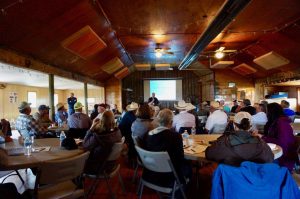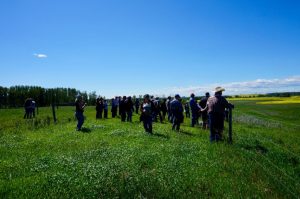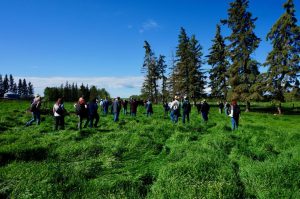…For some, you have to put your rubber boots and hat on.
This point was driven home in July as the Gentec team once again stepped into the pasture to organize two field days: this time, however, in collaboration with the Foothills Forage and Grazing Association, whose geographic area spans much of south-western Alberta.
The theme for the events was the ongoing interactions and efficiencies that can be achieved by managing the forages, the cow herd—and the interaction between the two. And as is always the case at these events, participants picked up many unanticipated practical nuggets as part of the official agenda or over coffee between sessions as well as the expected information on the application of new technologies and / or the novel application of existing technologies.
The first event began at the Waldron Ranch Grazing Cooperative near Longview where our host and Ranch Manager, Mike Roberts, provided a historical perspective of the ranch and its aim of maintaining the traditional grasses that hold much of their nutritional value throughout the winter. The most significant message was that preventing fire and grazing are not natural, economical or sustainable. On the contrary, they result in reduced soil health, less nutritious feed for the cattle, and reduced grassland efficiency for carbon sequestration. Ed Bork of the University of Alberta’s Rangeland Research Institute expands on that theme here.
Other practical nuggets included details on how introducing a sheep herd turned a $15,000/yr bill to control leafy spurge into a separate profit-centre for the ranch as well as the Waldron’s transition away from wood fenceposts and barbed wire to synthetic posts that don’t decompose (or burn) and two-strand electric fence. This option is less expensive, lasts longer, and is much easier for wildlife to figure out… which is also much easier on the fence!



For the second event, Gentec headed north to the Didsbury area to sessions hosted by Sean and Holly LaBrie (Difficulty Ranch) and Morrie and Debbie Goetjen (Whiskey Ridge Cattle). Both operations talked of the challenges involved in raising cattle in hot, dry summers and cold, snowy winters leading to heavy reliance on cell, swath and bale grazing.
Their practical experience with respect to the cow-herd mirrors the increasing empirical evidence that is part of the EnVigour HXTM project… that fertility is the most important factor influencing the viability of the cow herd by a wide margin, and that significant benefits can accrue by managing hybrid vigour with the herd. Alberta Agriculture and Forestry’s John Basarab and Gentec’s own Graham Plastow expanded on the benefits (and the $$ numbers) of hybrid vigour in greater detail on both days.
Barry Irving came out of retirement to challenge us to rethink some of the things we think we know for sure but evidence says otherwise. For example, producers commonly believe that cows won’t eat shrubs—or will eat shrubs under duress but won’t gain weight.
Using the results of a number of research projects, Barry showed that cattle will browse shrubs (aspen and others) by choice, that they can gain weight by doing so, and that knowing this gives the producer an additional option in managing how they feed their cattle (and the feed composition of their forage plots by limiting shrub propogation) by varying grazing intensity and stocking rates. Barry specifically declined to speculate on the degree of enjoyment experienced by the cattle in the shrub study!
Perhaps reflecting/reinforcing the age-old power of toys on boys, Thompson Rivers University’s John Church’s presentation on the ability of drones to manage, monitor, and track animals from kilometres away through dense bush, day and night—and read individual ear tags from a height of 70+ metres—had ranchers dreaming of flying above the trees. More on that in an upcoming newsletter.



Most importantly… Thank You to the members and Executive of the Foothills Forage & Grazing Association, The Waldron Ranch Grazing Cooperative, and the LaBrie and Goetjen families for inviting Gentec to see and hear the challenges and opportunities that keep our province’s producers awake at night. Knowing the right questions to ask/answer produces better science from the researchers and better application from those who deliver the food to our plates.
